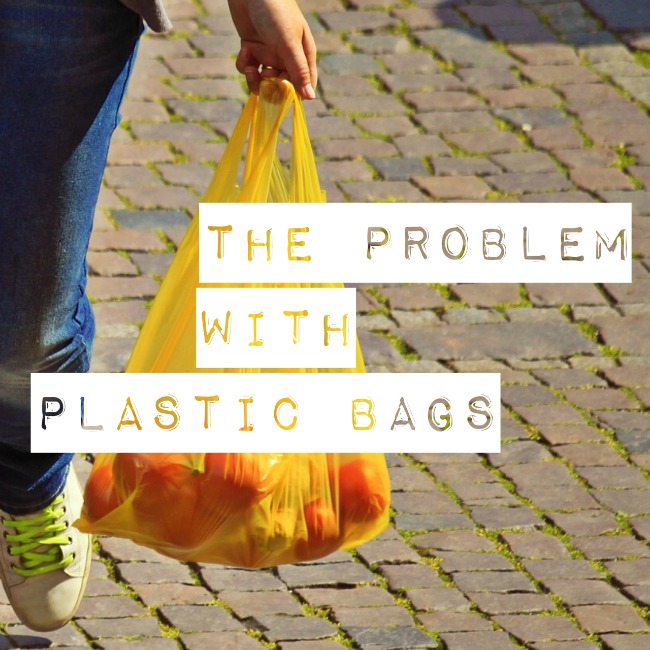You may have seen some recent media coverage of the new 5p charge for plastic bags across England, so I thought I’d provide some info today about the problem with plastic bags, and why we should be avoiding them whenever possible.

The issue in numbers
When we think about plastic bags most of us initially about the ones we get at the supermarket, but there are so many other places we collect them in our daily lives as well – in fact, pretty much everywhere we shop. As a result, Australians use around 10.6 million plastic bags every single day, equally 3.9 billion bags a year. That’s an astronomical number by any account.
In general, each bag is only used for as long as it takes to get the product home from the shops, which means each of those 3.9 billion bags has a useful life span of mere minutes. Under 5% of plastic bags are currently being recycled (they can be collected at most major supermarkets), which means almost all of them are eventually ending up in landfill, or worse, loose in our environment. It is believed around 200,000 plastic bags are deposited into landfill every hour in Australia.
So, what’s the problem with plastic bags?
Each plastic bag takes between 15-1000 years to break down, meaning we are stuck with them in our environment for many, many years to come. A huge number of these plastic bags end up in our environment either directly as litter, or blown out of landfill, ending up in our waterways, beaches, parks and streets.
This results in blocked drains and suffocated birds and other land animals, including larger animals which can die after eating the plastic bags. The cleanup of plastic bags from our parks and drains is incredibly expensive to local governments, businesses and community groups, which in turn is expensive for all of us.
The problem with plastic bags is even more evident in our waterways with tens of thousands of marine life killed every year, with plastic bags often being eaten after getting mistaken for jellyfish, or otherwise suffocating animals like turtles and seals. What’s even worse is that once the animal dies their body decomposes and then the plastic bag is left floating in the ocean and is able to cause the death of another sea creature.
It’s not just the plastic bags in their full form that are problematic either, as they slowly break down (over decades and even hundreds of years) they turn into smaller and smaller particles of plastic. These end up in the digestive systems of all kinds of land and sea creatures, clog waterways and spread pollution far and wide. So as you can see, plastic bags are a huge issue for our environment, and every bag we use makes the problem even worse.
Does a fee on plastic bags work?
Research shows that it definitely does work, even if it is just a nominal amount (like 5p!). What it does is trigger your conscience and make you think about why you’re being charged for the bag, and therefore make it more likely you will remember a reusable bag next time, or go without a bag altogether. It’s less about the money and more about creating a new habit.
The fee works particularly well if the money raised is then returned to the community in some way. In the UK, retailers are able to choose how they use the money they get from the fee, with many large supermarkets promising to donate the money to charity, which is a great outcome. The levy has been in place in Scotland, Wales and Northern Ireland for a few years already (England is just the last to join in!), with the number of bags used dropping by up to 80% which is an incredible result. It’s definitely something we should be looking at here in Australia!
What can you do to help?
The simple answer is to just say no to plastic bags! Most of us are pretty good when it comes to heading to the supermarket these days, but it’s much harder to remember when you’re out shopping for clothes and the like. I try and overcome this problem by keeping at least one (but usually more!) rolled up bags in the bottom of my handbag or backpack so I always have something on hand if I do some unexpected shopping or stop off for something on my walk home from work. If you’re after some lovely reusable bags then Biome^ is my go to shop of choice (for pretty much anything eco to be honest!).
For any bags that you already have floating around at home, the best option is to take them to your nearest recycling point where they can be turned into all kinds of useful things, including outdoor furniture for schools! Most major supermarkets have recycling points, and they also take any other soft plastics you might have on hand, so collect them all up for your next trip!






Do You Really Need That Drastic Bag?
October 26, 2015 at 11:21 pm (8 years ago)Great post! Agree a million times over.
Very similar to the work we are doing! Did you know that paper bags are possibly just as bad?
We at Drastic Bag always keep a reusable bag in our backpacks for emergencies too!
Check out our website – would love to chat!
https://drasticbag.wordpress.com/
– Do You Really Need That Drastic Bag?
I Spy Plum Pie (admin)
November 3, 2015 at 8:34 am (8 years ago)Yep, a reusable bag is definitely the best option. Love your work!